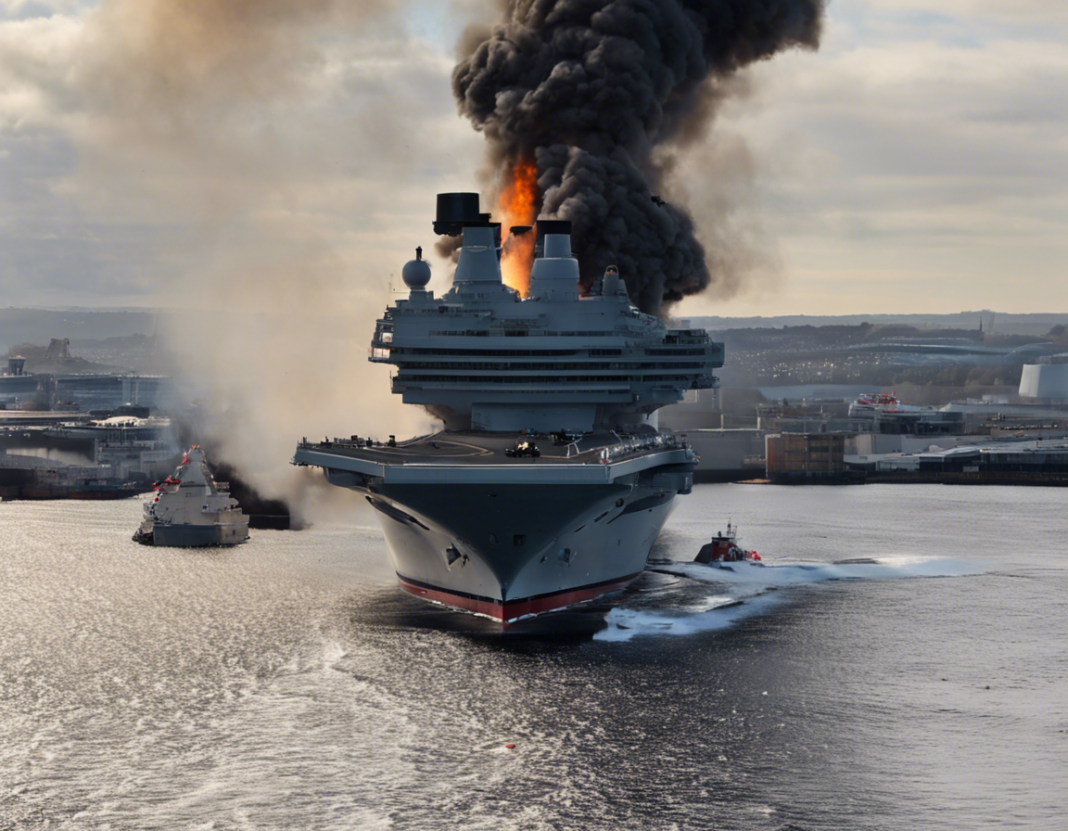On October 29, 2021, the Royal Navy’s pride and joy, HMS Queen Elizabeth, the newest and largest aircraft carrier in the British fleet, experienced a devastating fire onboard. The incident occurred while the ship was undergoing sea trials off the coast of the United States, near the Hampton Roads area in Virginia. The fire broke out in a machinery space on the aft part of the ship, leading to a large plume of dark smoke visible from miles away. The crew swiftly responded to the emergency, and after several hours of intense firefighting efforts, the blaze was finally extinguished. Fortunately, there were no reported injuries among the crew, and the structural integrity of the vessel remained intact.
Causes and Investigation
The exact cause of the fire is still under investigation, with initial reports pointing towards a potential electrical fault. As the investigation progresses, experts are examining all possible triggers, including equipment malfunctions, human error, or any other contributing factors that may have led to the incident. It is imperative to uncover the root cause to prevent similar incidents in the future and ensure the safety of crew members and the integrity of the ship.
Impact on Operations
The fire onboard HMS Queen Elizabeth caused a temporary halt to the sea trials, as the focus shifted to securing the affected area, assessing the damage, and implementing necessary repairs. The Royal Navy has reassured the public that the carrier remains fully operational, and the incident has not derailed the overall schedule for the deployment and integration of the aircraft carrier strike group. Despite the setback, the navy is committed to addressing any setbacks promptly and upholding its operational readiness.
Lessons Learned and Safety Measures
The fire onboard HMS Queen Elizabeth serves as a poignant reminder of the inherent risks associated with naval operations, especially on complex vessels like aircraft carriers. It underscores the importance of robust safety protocols, regular training drills, and a vigilant crew capable of responding swiftly and effectively to emergencies. The incident highlights the need for continuous review and enhancement of safety measures, equipment maintenance, and crew preparedness to mitigate risks and ensure the highest standards of safety at sea.
Preventive Measures and Future Preparedness
In the aftermath of the fire, the Royal Navy is likely to implement additional preventive measures and safety enhancements to bolster the resilience of its fleet against similar incidents. This may include more frequent inspections of critical systems, upgrades to electrical components, enhanced firefighting capabilities, and advanced training programs for crew members to improve their response to emergencies. By investing in proactive measures and fostering a culture of safety consciousness, the navy aims to fortify its fleet and protect its personnel against unforeseen challenges at sea.
Frequently Asked Questions (FAQs)
Q: Was there any damage to the aircraft or aviation capabilities of HMS Queen Elizabeth due to the fire?
A: Fortunately, the fire was contained in a machinery space and did not impact the aircraft or aviation operations of the carrier.
Q: How long did it take to extinguish the fire onboard HMS Queen Elizabeth?
A: The firefighting efforts lasted several hours before the fire was successfully extinguished by the crew.
Q: Were there any casualties or injuries among the crew during the incident?
A: Thankfully, there were no reported injuries or casualties among the crew of HMS Queen Elizabeth.
Q: What measures are being taken to prevent similar incidents in the future on board the aircraft carrier?
A: The Royal Navy is conducting a thorough investigation to determine the root cause of the fire and is expected to implement additional safety measures and training enhancements to prevent similar incidents in the future.
Q: How did the fire onboard HMS Queen Elizabeth impact the overall deployment schedule of the aircraft carrier strike group?
A: While the sea trials were temporarily paused, the Royal Navy has stated that the incident has not significantly affected the deployment schedule of the aircraft carrier strike group.

